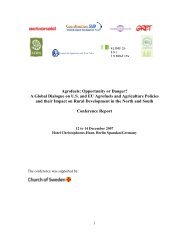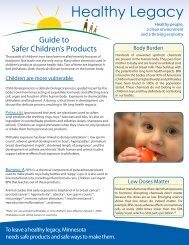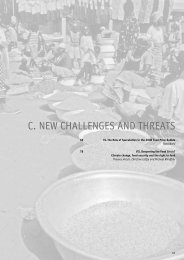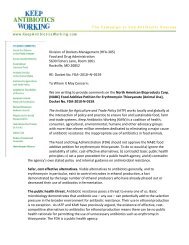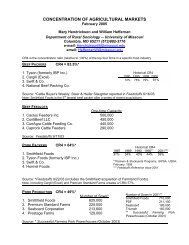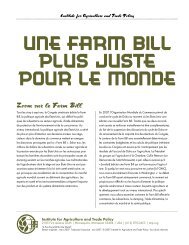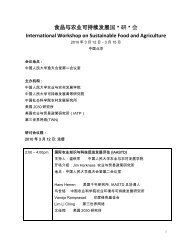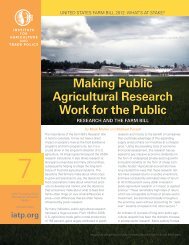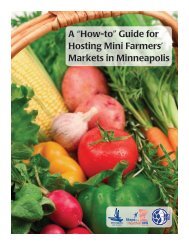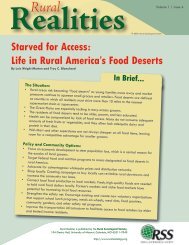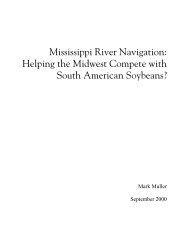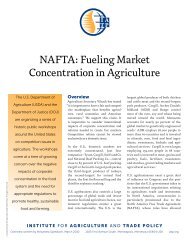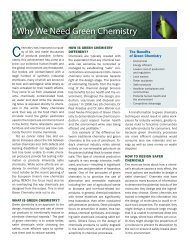IATP Hog Report - Institute for Agriculture and Trade Policy
IATP Hog Report - Institute for Agriculture and Trade Policy
IATP Hog Report - Institute for Agriculture and Trade Policy
Create successful ePaper yourself
Turn your PDF publications into a flip-book with our unique Google optimized e-Paper software.
Section 2<br />
Alpharma respectively, sued Denmark <strong>and</strong> the EU, seeking a reversal of<br />
the decision <strong>and</strong> asking <strong>for</strong> an immediate suspension of the regulation's<br />
"operation." 128 On June 30, 1999, the President of the European Court of<br />
First Instance found against the companies' request <strong>for</strong> immediate<br />
suspension, because the companies had not shown that the ban on sales in<br />
the European Union would cause them serious <strong>and</strong> irreparable damage,<br />
<strong>and</strong> because "public health must take precedence over economic<br />
considerations." 129 The question of the decision itself is pending.<br />
Assessing the Impacts of a Ban on Subtherapeutic Antibiotic Use<br />
To ease the transition to antibiotic restrictions, scientists have<br />
recommended adoption of "better feeding practices <strong>and</strong> production<br />
systems that promote animal health <strong>and</strong> welfare." 130 In Sweden, it was the<br />
farmers, through their national organization, Lantbrukarnas Riksförbund<br />
(LRF), who urged the government to ban the subtherapeutic use of<br />
antibiotics in animal feeds. Then took action to maintain the confidence of<br />
Swedish consumers in the safety of Swedish-produced meat, dairy, <strong>and</strong><br />
poultry products in response to the debate that was occurring in the 1980s<br />
regarding antibiotic resistance. But, the immediate result was that many<br />
piglet farmers incurred economic losses due to an increase of diarrhea in<br />
weaned piglets. Because there was a law, however, they had to go<br />
<strong>for</strong>ward. In a 1992 interview, LRF economic policy advisor Gunnela<br />
Ståhle stated: 131<br />
Antibiotics are only allowed after prescription <strong>for</strong><br />
treatment of illness. And that is the first steptoward better<br />
animal welfare. If you are not allowed to use antibiotics as<br />
preventive measures, you must correct your environment ...<br />
better housing, better environment, better management in<br />
order to prevent disease.... When you don't consider<br />
animal welfare you have to use antibiotics to cover the<br />
problems.<br />
In a 1992 interview, then Minister of <strong>Agriculture</strong> Karl-Erik Olsson<br />
described the rationale behind the Swedish antibiotic law: 132<br />
The idea is that we shall not use antibiotics in the feed to<br />
prevent diseases or grow the animals faster. If there is<br />
something wrong we can use it <strong>for</strong> the single animal. But if<br />
you have the possibility to use antibiotics in the feed, you<br />
can keep the animals in a worse situation, <strong>and</strong> this use of<br />
antibiotics will hide the real problems. So when we cannot<br />
use them, we will create a situation <strong>for</strong> the animal that is<br />
natural <strong>and</strong> good.<br />
http://www.iatp.org/hogreport/sec2.html (17 of 38)2/27/2006 3:50:06 AM



